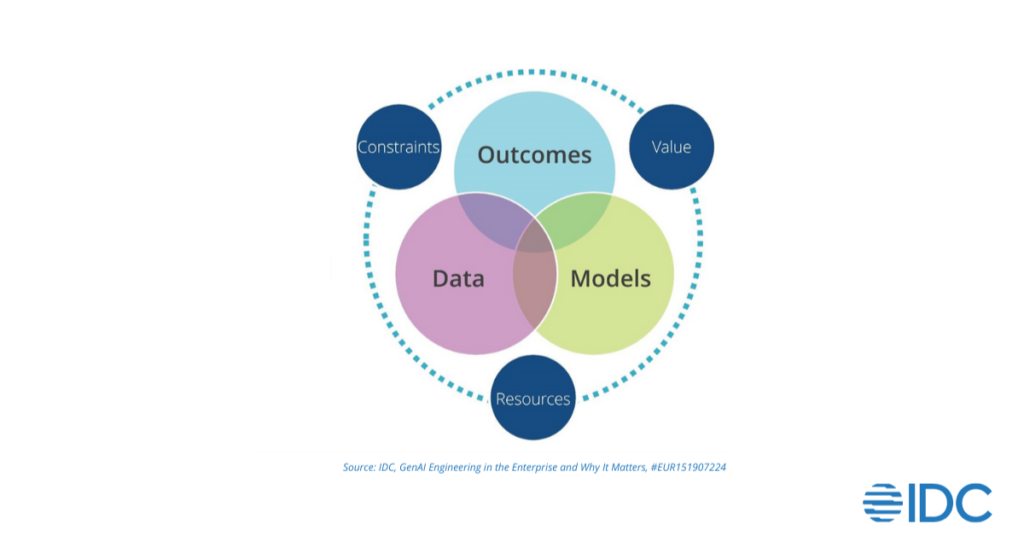In the dynamic world of technology, startups and growing tech vendors are constantly seeking innovative ways to stay ahead of the curve. The rise of generative AI (GenAI) offers a transformative opportunity, but leveraging its full potential requires more than just adoption—it necessitates a strategic approach called GenAI Engineering. This blog post delves into why GenAI Engineering matters for tech vendors and startups and how it can be a cornerstone of your growth strategy.
The GenAI Boom: A Catalyst for Innovation
Since the launch of ChatGPT in November 2022, the potential of GenAI has become evident across industries. From GitHub CoPilot to DALL-E and Google Bard, GenAI applications have showcased incredible capabilities in automating tasks, enhancing creativity, and improving decision-making processes. This surge in GenAI adoption is particularly relevant for tech startups and vendors who are uniquely positioned to harness these advancements for rapid innovation and market differentiation.
The Pitfalls of Consumer-Focused GenAI
While consumer-focused GenAI services have ignited interest, they often fall short in addressing the specific needs of enterprises, especially those in the tech sector. Startups and tech vendors require GenAI solutions that align with business objectives like scalability, accuracy, privacy, and cost-efficiency. For instance, concerns about data security, intellectual property, and the accuracy of GenAI outputs are paramount for these organizations.
What Is GenAI Engineering?
GenAI Engineering integrates concepts and decision-making between three overlapping and interdependent domains:
Data Domain: High-quality data is the bedrock of successful GenAI projects. Startups must focus on data sourcing, quality, and privacy. Questions like where the data is sourced, its appropriateness for the intended outcomes, and its security are crucial.
AI Models Domain: Selecting and customizing the right GenAI models is essential. Startups need to consider the types of models that best suit their needs, how to fine-tune these models, and ensure their outputs are reliable and high-quality.
Outcomes Domain: GenAI implementations must be outcome-driven. This involves choosing the right implementation approach, determining the degree of autonomy for AI components, and selecting appropriate infrastructure platforms.

Three Reasons Why GenAI Engineering is Critical for Startups and Tech Vendors
GenAI Engineering is the disciplined approach to implementing GenAI technologies in a way that aligns with business goals and maximizes value. For startups and growing tech vendors, this means:
- Strategic Implementation: GenAI Engineering bridges the gap between strategy and execution, ensuring that GenAI projects are aligned with business outcomes, resources, and constraints.
- Scalability and Flexibility: By systematically applying clear business and technology principles, startups can scale their GenAI implementations efficiently, adapting to changing market demands and opportunities.
- Innovation and Competitive Edge: GenAI Engineering empowers startups to innovate rapidly, offering customized solutions that differentiate them from competitors and appeal to their target markets.
Governing Factors in GenAI Engineering
For tech startups, the following factors are critical:
- Value: Focus on outcomes that improve productivity, enhance product offerings, and drive growth. Startups need to evaluate the potential ROI of GenAI projects.
- Resources: Assess available resources, including data, skills, tools, and infrastructure. Startups often operate with limited resources, making strategic resource allocation vital.
- Constraints: Navigate industry regulations, internal policies, and risk management. Understanding these constraints helps in developing responsible and compliant GenAI solutions.
Collaboration: The Heart of GenAI Engineering
Effective GenAI Engineering ideally involves collaboration across various roles, such as CISOs, CDOs, data engineers, data scientists, developers, and non-technical domain experts. However, startups often lack the resources to have all these roles in-house. Here are practical steps for startups to initiate GenAI engineering:
- Leverage Partnerships: Collaborate with universities, research institutions, and other tech startups. These partnerships can provide access to expertise, resources, and infrastructure that may be beyond the reach of a startup.
- Utilize Open Source Tools: Take advantage of open-source GenAI tools and platforms. Communities like Hugging Face and GitHub host a multitude of projects that can accelerate your development efforts without significant upfront costs.
- Engage with GenAI Platforms: Use AI platforms provided by major cloud providers like AWS, Google Cloud, and Azure. These platforms offer ready-to-use models, development tools, and infrastructure support that can help startups implement GenAI solutions quickly and cost-effectively.
- Hire Freelancers and Consultants: Bring in external experts on a project basis. Freelancers and consultants can provide the specialized skills needed for specific tasks without the long-term financial commitment of full-time hires.
- Build a Cross-Functional Core Team: Assemble a small, cross-functional team with diverse skills. Even with limited resources, having a core team that includes data engineers, developers, and business analysts can drive GenAI projects forward.
- Invest in Training: Upskill existing employees through training programs focused on GenAI technologies. Online courses, workshops, and certifications can equip your team with the knowledge needed to implement GenAI solutions effectively.
Establishing a GenAI Center of Excellence (CoE)
For many startups, creating a GenAI Center of Excellence (CoE) can be a strategic move. A GenAI CoE can:
Centralize Expertise: Bring together experts from various domains to drive GenAI initiatives.
Promote Best Practices: Share success stories, establish standards, and ensure consistent application of GenAI Engineering principles.
Drive Innovation: Act as a hub for exploring new GenAI opportunities and developing cutting-edge solutions.
Practical Steps
Start with Data: Ensure you have a solid foundation of high-quality data. Implement robust data governance practices to maintain data integrity and privacy.
Choose the Right Models: Evaluate different GenAI models and select those that best align with your business goals. Consider fine-tuning and customizing models to meet specific needs.
Focus on Outcomes: Define clear business outcomes for your GenAI projects. Ensure that every implementation is aligned with these outcomes to maximize value.
Invest in Skills: Build a team with the necessary skills and expertise. Invest in training and development to keep your team updated on the latest GenAI advancements.
Foster Collaboration: Encourage collaboration across different roles and teams. Establish clear communication channels and collaborative tools to facilitate teamwork.
Key GenAI Use Cases for Startups and Growing Tech Vendors
Understanding the potential use cases for GenAI can help startups identify where to focus their efforts:
Task Productivity: Simple tasks like summarizing reports, generating job descriptions, or creating code snippets. GenAI can automate these tasks, freeing up valuable time for employees to focus on more strategic activities. For instance, integrating GenAI capabilities into everyday tools like email clients or project management software can significantly boost productivity.
Business Function or Process Improvement: Enhancing specific business functions such as marketing, sales, customer service, or procurement. By integrating GenAI with corporate data, startups can streamline processes and improve efficiency. For example, a GenAI-powered chatbot can provide 24/7 customer support, handling common queries and escalating more complex issues to human agents.
Industry-Specific Product/Service Innovation: Developing innovative products or services tailored to specific industries. This often requires custom-built or heavily customized GenAI models. For instance, a health tech startup might develop a GenAI model trained on medical data to assist doctors in diagnosing diseases or recommending treatments.
Conclusion
For tech startups and growing vendors, GenAI Engineering is not just a strategic advantage—it is a necessity. By adopting a disciplined approach to GenAI implementation, these organizations can unlock new levels of innovation, scalability, and competitive edge. As the GenAI landscape continues to evolve, those who invest in GenAI Engineering today will be the leaders of tomorrow.
Ready to take your startup to the next level with GenAI? IDC’s leading-edge expertise and solutions created with growing tech vendors in mind help you navigate these challenges and implement effective safeguards. Contact us today to learn how IDC can help you create successful GenAI strategies and thrive in the Era of AI Everywhere.
Discover how IDC’s AI Use Case Discovery Tool can elevate your AI strategy—learn more here.




